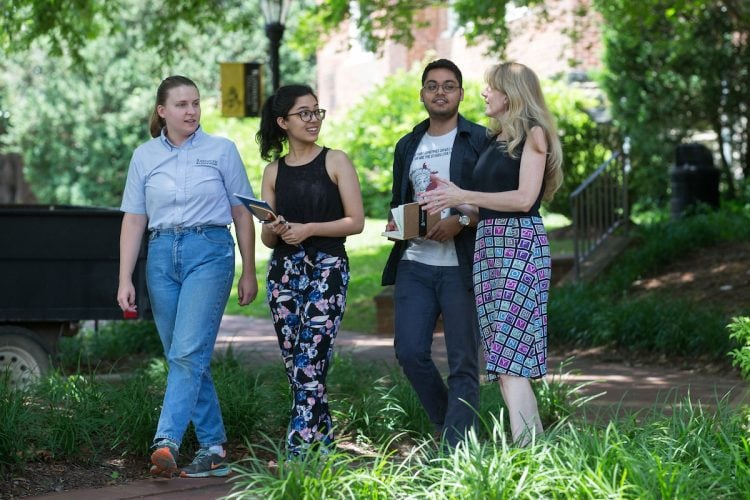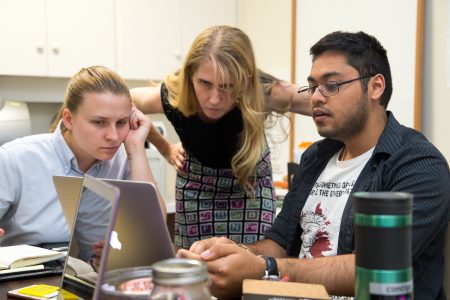Resilient Research

(From left) Sustainability coordinator Sara Woodward ’16, Shataaxi Joshi ’19, Arnav Upadhyay ’19, and the Herzog Family Chair of Environmental Studies Karin Warren discuss their project while walking on campus.
Growing up in Nepal in the shadows of some of the world’s tallest mountains, Arnav Upadhyay ’19 endured brutally cold winters and frequent snowstorms. As he grew older, he could sense the winters getting slightly warmer and more tolerable each year. This summer, he is taking action by helping Randolph College and the City of Lynchburg prepare for similar environmental changes.
Upadhyay is working on a Summer Research project alongside Shataaxi Joshi ’19, Randolph Sustainability Coordinator Sara Woodward, and the Herzog Family Chair of Environmental Studies Karin Warren. The group’s main goal during the eight-week program is to review and suggest revisions to both Randolph’s and the City of Lynchburg’s sustainability plans. They are also planning a community workshop in spring 2018 to educate interested stakeholders about the concept of climate resilience, which is the approach an organization or community takes to mitigate or adapt to the effects of climate change.
“Every community in the world is going to have to deal with this in some way,” Warren said. “They’re going to be looking at more drought in some places, or heavier rainfall during both the winter and summer. And we might not get more snowstorms, but we could get ones that are heavier, which are things that disrupt our power, our roads, our schools, and emergency services. So if we can look ahead and anticipate these changes, we can bolster our ability to deal with them when they happen. It’s less expensive to be proactive than reactive.”

Sustainability coordinator Sara Woodward ’16, the Herzog Family Chair of Environmental Studies Karin Warren, and Arnav Upadhyay ’19 research local weather patterns.
For his part, Upadhyay is studying local weather patterns, and so far he has found that heat waves are one of the most immediate climate threats to the Lynchburg area. In fact, an EPA report has shown that the average number of days above 95 degrees Fahrenheit is on pace to triple in the next 50 years. Rainfall is also expected to increase, which could cause flooding and sewage issues.
As he studies environmental impacts on businesses, he has found that the project is a great fit for his economics major.
“I really enjoy studying economics, and seeing how climate affects the way the world handles its money,” Upadhyay said. “And, I just see that at some point there is going to be a change. I don’t know whether it will be good or bad, but at some point it’s bound to happen. This project is something that will help me understand what we’re all headed towards and the impact climate will have on the economy in the future.”
Joshi, also a native of Nepal, is examining climate action plans the College and the City of Lynchburg already have in place. Environmental sustainability has been a major objective for Randolph, which was the first institution in Virginia to sign the American College and University President’s Climate Commitment in 2006. In January of this year, President Bradley W. Bateman signed the President’s Resilience Commitment, which pledges that the College will take steps to reduce its carbon footprint, and most recently the “We Are Still In” document in response to the United States’ withdrawal from the Paris Agreement.
Lynchburg has also taken significant steps to address environmental issues in its ongoing downtown revitalization project. Joshi has been dividing climate risks into different sectors including health, transportation, water, and food. She is also contacting city officials to find out more about the city’s sustainability efforts and invite stakeholders to the climate resilience workshop the group is planning.
As a psychology major, one of her favorite aspects of the project is gaining a better understanding of how people from different backgrounds perceive climate change.
“Climate change is such a huge issue right now, and you don’t have to be an environmental major to know what’s going on,” Joshi said. “If we don’t do something right now, it’s going to affect us all eventually, so I was just really interested in this project, how climate change is affecting the local region, and how Lynchburg is responding.”
Woodward said the project is building the foundation and setting goals for much of the work by the Randolph Sustainability Council during the 2017-18 academic year. The group will present its findings and recommendations at the Summer Research Symposium July 7, and will also attend the Association for the Advancement of Sustainability in Higher Education (AASHE) conference in San Antonio, Texas this October.
Tags: Arnav Upadhyay, Center for Student Research, environmental science, environmental studies, environmental sustainability, Karin Warren, Sara Woodward, Shataaxi Joshi, student faculty research, summer research, Summer Research 2017, sustainability, sustainability research
